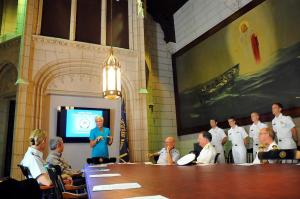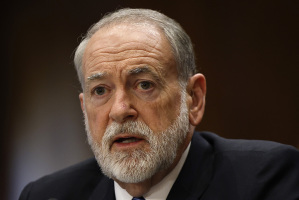Atheists Lose Another 'God' in Pledge Battle
The U.S. Court of Appeals for the First Circuit upheld the constitutionality of the recitation of the Pledge of Allegiance in New Hampshire's public schools.
The decision on Friday by the three-judge panel dealt another blow to atheists who have made several attempts to strike down the pledge and the inclusion of the words "under God" as unconstitutional.
The Freedom From Religion Foundation filed a lawsuit in 2007 on behalf of two parents whose three children were attending public schools. The parents are atheist and agnostic.
They challenged the New Hampshire School Patriot Act which requires that the state's public schools authorize a period during the school day for students to voluntarily participate in the recitation of the national pledge. The act allows students who choose not to participate to stand silently or remain seated and to respect the rights of those pupils electing to participate.
After a court dismissed the atheists' lawsuit, FFRF filed an amended complaint the following year, arguing that the state act violates the Establishment Clause, despite the voluntary nature of student participation in the pledge. The group argues that the schools' pledge practices are religious because the pledge itself is a religious exercise in that it uses the phrase "under God."
Chief Judge Sandra Lea Lynch wrote in the opinion that by design, the recitation of the pledge is meant to further "the policy of teaching our country's history to the elementary and secondary pupils of this state."
Rejecting the argument that the act is an unconstitutional endorsement of religion, Lynch stated, "In reciting the Pledge, students promise fidelity to our flag and our nation, not to any particular God, faith, or church."
The primary effect of the New Hampshire Act is not the advancement of religion, but the advancement of patriotism, she added.
"It takes more than the presence of words with religious content to have the effect of advancing religion, let alone to do so as a primary effect," the judge wrote. "The Pledge and the phrase 'under God' are not themselves prayers, nor are they readings from or recitations of a sacred text of a religion.
"Here, the words 'under God' appear in a pledge to a flag – itself a secular exercise, accompanied by no other religious language or symbolism."
Forty members of Congress and more than 80,000 Americans filed an amicus brief in support of the state act.
Lauding the decision, the American Center for Law and Justice said the ruling underscores what most Americans understand – "that the recitation of the Pledge of Allegiance embraces patriotism, not religion."
"The decision not only upholds the constitutionality of the Pledge, it rejects another fruitless attempt by the Freedom From Religion Foundation to twist and distort the Constitution with its flawed reasoning," the ACLJ commented.
"This decision regarding the Pledge in NH schools represents a significant and sound decision that sends a message: patriotic, time-honored traditions should be embraced – not targeted for extinction – in our public schools."
Earlier this year, a similar ruling was made against a lawsuit brought by Sacramento atheist Michael A. Newdow. The U.S. Court of Appeals for the Ninth Circuit ruled that the Pledge of Allegiance is an endorsement of "our form of government" and not of religion.





























